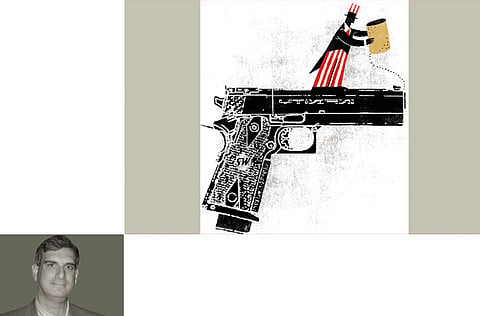Can America confront its gun culture?
The only thing that can accomplish effective gun control is electoral mandate

Ever since last December’s massacre at an elementary school in Newtown, Connecticut, the question of gun control has haunted US politics. America’s attachment to guns is unique, as is its imperviousness to the sort of outrage a mass shooting generates pretty much anywhere else in the world.
Newtown, however, was different, or at least it seemed so at the time. Perhaps it was the age of the victims — six and seven-year-olds gunned down in their school, along with the adults trying futilely to protect them. Perhaps it was the timing of the massacre, coming just nine days before Christmas. Perhaps it was just one gun-centred outrage too many.
Yet, there was US President Barack Obama last week, standing in the East Room of the White House, surrounded by gun-control supporters, not to celebrate the signing of a new law, but to criticise himself and the rest of Washington for failing to produce one.
Emotional, and visibly angry, Obama, said: “Less than 100 days ago that happened and the entire country was shocked. And the entire country pledged that we would do something about it and that this time would be different. Shame on us if we’ve forgotten. I haven’t forgotten those kids. Shame on us if we’ve forgotten them.”
In the wake of Newtown, three priorities had emerged among those eager to turn the nation’s shock into concrete action: A ban on military-style assault weapons, like the one used at Newtown and in a number of other recent shootings; a ban on high-capacity ammunition magazines (the theory being that the more often a shooter needs to reload the easier it will be to stop him); and closing the loopholes that allow, by some estimates, 40 per cent of US gun sales to take place without a background check.
Obama supported all of these measures and in his State of the Union address brought listeners to an emotional crescendo by repeatedly citing the victims of Newtown and other mass shootings and insisting that “they deserve a vote”.
Three months after Newtown, and barely six weeks after the State of the Union address, a new assault weapons ban is legislatively dead as are any serious efforts to regulate high-capacity magazines. Universal background checks for gun buyers hangs by a thread.
The easy answer is that gun advocates, as they always do in the US, waited for the moment of outrage to fade before launching a two-pronged defence. First, the National Rifle Association (NRA), and similar organisations, stoked fear among their members that any new gun-control measure, no matter how mild, would be a first step towards weapons confiscation. Meanwhile, at congressional hearings and other policy forums, they argued that since no ban can guarantee the complete end of gun violence, any gun-control measure is essentially pointless.
The more nuanced answer is that even in the appalled aftermath of Newtown, gun-control legislation ran up against one of Washington’s most brutal political realities: The fear many politicians have of the NRA.
Next year, Democrats will be defending a number of senate seats in states that tend to lean towards Republicans. Freshman Democrats, who had won those seats by narrow margins, riding Obama’s coattails in 2008, must now face the voters during a mid-term election. Obama will not — on the ballot and mid-terms historically — tend to favour the opposition party. Even among those who support gun control (and, to be clear, this is not a conventionally partisan issue — many otherwise progressive Democrats are just as pro-gun as their Republican opponents) none of these Democrats wants to cast a vote that will anger the NRA if they can possibly avoid doing so.
Here is the odd thing, however: The same opinion polls that show national enthusiasm for gun control waning, as Newtown becomes a memory, also indicate that huge majorities of Americans support universal background checks — more than 90 per cent in the some polls, including majorities of gun owners and even NRA members.
Yet, background checks still stand only a slim chance of becoming law. How can this be?
Simply put, because no opinion survey will ever convince members of Congress that the NRA’s power has waned. The only thing that will accomplish that is electoral defeat. The polls may say that support for background checks is near-universal, but until a couple of Congressmen lose their seats over the issue, no one in Washington is ever going to believe that is really the case.
Obama has more events around the country scheduled this week to promote gun control and the emotion in his voice last Thursday made it clear that he is not just going through the motions. However, the real political play here may be a longer one: To keep enough momentum behind the issue to make it resonate in 2014. If voters use that opportunity to punish candidates for doing the gun lobby’s bidding, then, and only then, are Americans likely to see a dramatic change in the strange and unique relationship between American politicians and guns.
Gordon Robison, a longtime Middle East journalist and US political analyst, teaches political science at the University of Vermont.
Sign up for the Daily Briefing
Get the latest news and updates straight to your inbox



